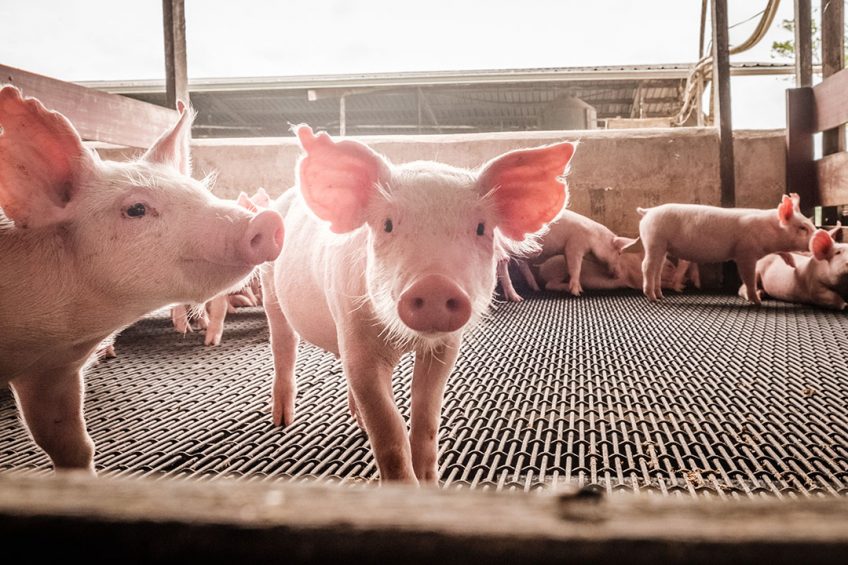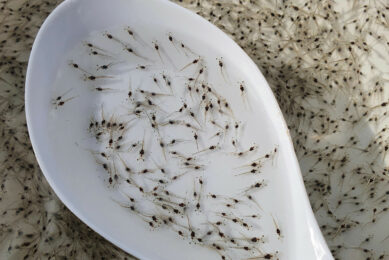Heat stress in pigs – effect on the gut

Heat Stress is a physiological response to high environmental temperatures, where the animal is out of its thermoneutral zone and can no longer effectively regulate its body temperature. Consequently, animal health, well-being and performance are negatively affected.
When pigs are exposed to high environmental temperatures, several behavioural, physiological and metabolic mechanisms are activated to reduce heat production and increase heat dissipation to maintain the body temperature within normal physiological ranges (Figure 1). The most effective mechanism to reduce heat production is to lower the feed intake. This drop in feed intake is more accentuated as the body weight increases. It has been reported that pigs of 60-100 kg bodyweight raised in south-eastern Brazil during summer have about 15% lower growth rates compared to pigs raised during the winter, an effect that can be explained in part by the decreased feed intake during the hot season.
Figure 1- Physiological response and consequences of heat stress in pigs.

Other mechanisms to maintain the body temperature include evaporation and radiation. In some species, evaporation is achieved through sweating, which is a very efficient mechanism of heat dissipation. However, pigs have few, if any, functional sweat glands and evaporation relies only on drooling and an increased respiration rate (panting). Consequently, pigs have a lower capacity of regulating their body temperature through evaporation and depend on radiation to dissipate excessive heat.
Radiation implies an increased blood flow to the periphery, which decreases blood flow to internal organs, including the reproductive and the digestive tract. Consequently, the intestinal barrier can be damaged, leading to the well-known ‘leaky gut’ syndrome and a poor growth performance and health. Moreover, a lower reproductive performance has been observed in pigs under heat stress conditions, affecting the overall productivity of the production system.
Focus on the gut
The reduction of feed intake and the decreased blood flow to the digestive tract leads to a lower supply of oxygen and nutrients to the intestine, thus affecting the normal function of the intestinal barrier. The negative impact of heat stress on the gut epithelium is evidenced by a reduction of villus height and changes in the membrane function of the enterocytes. Heat stress alters the number and function of the enterocytes and reduces the digestive and absorptive capacity of the intestine. Furthermore, cell transporters of nutrients, especially of amino acids, are affected in heat stress conditions, so that fewer amino acids can be absorbed and used for growth.
Besides the reduction of the intestine absorption capacity, the damage to the intestinal mucosa causes intestinal inflammation and increases cell turnover and subsequent amino acid losses. Hypoxia, hyperthermia and intestinal inflammation can cause oxidative stress, which can disrupt the tight junction proteins and increase intestinal permeability, compromising the integrity of the intestinal barrier. Furthermore, an increased intestinal permeability allows the entrance of pathogens and toxins from the intestinal lumen, which can reach subepithelial tissues and activate an immune response.
How can nutrition alleviate heat stress?
Effective management and nutritional strategies that reduce the negative impact of heat stress on animal health and performance are essential to meet the needs of the current swine industry and to ensure the profitability and sustainability of the animal production system.
Herbal extracts from Macleaya cordata (plume poppy) have been extensively investigated as an effective nutritional strategy to improve growth performance by promoting intestinal health. The isoquinoline alkaloids (IQ) contained in this plant have demonstrated a pronounced local anti-inflammatory effect in pigs and other species, as evidenced by a significant reduction of circulating acute phase proteins and other biomarkers of inflammation. In addition, the use of IQ in food animals has shown to improve integrity and reduce permeability of the intestinal barrier (Figure 2). Furthermore, supplementing pigs with IQ has shown to improve nutrient digestibility and down-regulate stress response.
Figure 2 – Effect of IQ supplementation on tight junction proteins, as a measure of the integrity of the intestinal mucosa.

IQ supplementation and heat stress
A research study was conducted at the University of Melbourne, Australia, to evaluate the effect of IQ supplementation on the intestinal barrier and other physiological parameters. Preliminary results indicated that supplementing pigs with 150 ppm of IQ (Sangrovit Extra, Phytobiotics) significantly improved physiological responses to heat stress, including a reduction in respiration rate (P=0.013) and rectal temperature (P=0.001). Furthermore, IQ-supplemented pigs tended to have a lower intestinal permeability when exposed to high environmental temperatures (P=0.059) and an improved feed conversion ratio (FCR) after 2 weeks of supplementation (P=0.085).
In conclusion, these results confirmed that poor performance associated with heat stress is mediated by the damage to the intestinal mucosa, leading to a poor nutrient digestion and absorption. Therefore, IQ supplementation could be a potential nutritional strategy to alleviate the negative impact of heat stress on the intestinal barrier function of pigs and prevent the occurrence of ‘leaky gut’, which leads to disease and poor performance.
Key facts about heat stressWhy is heat stress a current and emerging issue?
Why does heat stress have a high economic impact?
|
References available on request
Author: Valeria Artuso-Ponte, Global Product Management Swine, Phytobiotics Futterzusatzstoffe GmbH, Germany










